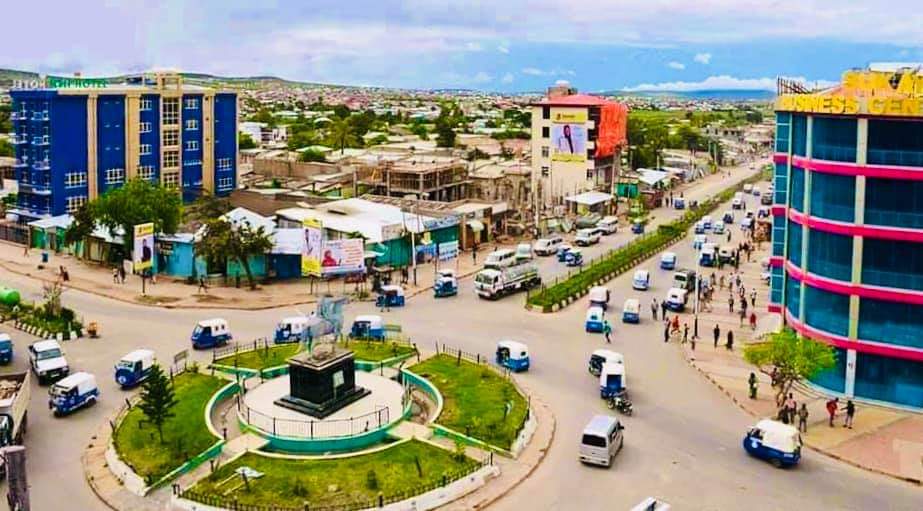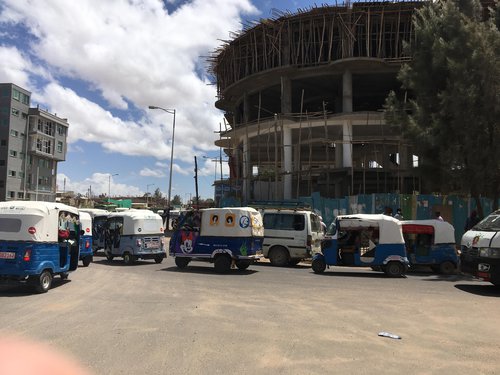Facebook Twitter (X) Instagram Somali Magazine - People's Magazine
Despite a Billion-Birr Investment, Residents Still Struggle for Water as Officials and Contractors Face Allegations of Fraud and Misconduct
Due to its arid lowlands and limited surface water, the Somali Regional State—like much of eastern Ethiopia—faces persistent risks of drought and water shortages. Despite sitting atop substantial groundwater reserves and possessing natural gas deposits that are central to the government’s future plans, these resources remain largely untapped.
Jigjiga, a prominent city in the dry eastern lowlands and the administrative hub of the Somali region, is not exempt from the severe water supply challenges. The city requires an estimated 40,000 cubic meters of water daily, yet existing infrastructure can barely meet 20 percent of this demand.
In June 2024, when Somali regional officials, led by President Mustafa Omar, inaugurated the Jigjiga Clean Water Project, residents celebrated in the hope that their long-standing struggles with water scarcity would come to an end.
State and national media lauded the 1.4 billion birr initiative, officially known as the ‘Jigjiga Water Project Phase Two,’ as a major achievement. Regional water bureau officials gave interviews highlighting how the project would double the city’s water supply, covering 52 percent of its population. The project even garnered praise from Prime Minister Abiy Ahmed.
However, just months after its launch, residents saw no improvements in their water access. Interviews conducted by The Reporter with locals and officials revealed that even the existing water supply had deteriorated, let alone any improvements from the newly inaugurated project.
Jigjiga primarily sources its water from Jerer (Waji) and seven wells located roughly 20 kilometers north of the city. However, these sources are insufficient to meet the growing demand.
Sources informed The Reporter that the new project has disrupted existing infrastructure, with corruption and mismanagement being cited as key reasons for its failure.
Earlier this month, The Reporter published an article detailing Jigjiga’s water shortages and allegations of corruption linked to the newly launched project. Within a week of publication, President Mustafa Omar dismissed Somali Water Resources Development Bureau head Hassen Mohammed, replacing him with Somali Prosperity Party deputy head Mohammed Umer Ahmed. However, Mohammed was soon replaced by Ahmed Mirad, an engineer.
Following these reports, Somali regional officials and representatives of the China Civil Engineering Construction Corporation (CCECC), a contractor for the project, launched media and legal campaigns denying corruption allegations and attempting to discredit The Reporter.
Background of the Project
The second phase of the Jigjiga Water Project was initiated in 2017 with plans to extract groundwater from Fafaan, located less than 25 kilometers from the city.
However, the project was halted in 2018 amid Ethiopia’s political transition, which saw Abdi Illey’s rule replaced by the more stable administration of Mustafa Omar. The new leadership promptly terminated the contract with the original contractor, leading to legal battles. The dismissed contractor sued for 120 million birr in compensation for alleged unlawful termination, while the regional Water Bureau countersued over project delays. The case remains unresolved.
Despite the legal disputes, the project remained stagnant until 2021 when the regional administration revisited Jigjiga’s chronic water crisis and decided to relaunch the initiative under the name ‘Phase Two.’
In June 2021, the Somali Water Development Bureau (SWB) directly awarded the contract to CCECC, with MS Consultancy appointed as the project supervisor.
Documents obtained by The Reporter indicate that the Bureau consulted five Chinese contractors before selecting CCECC, violating Ethiopian public procurement laws that require competitive bidding. Direct contract awards are only permissible in cases where no competitive options exist.
Nevertheless, the contract was signed and finalized by then-SWB chief Abdirahman Ahmed Hassan. On June 22, 2021, CCECC representatives confirmed their acceptance of the contract, which was signed by Guo Chongfeng, an authorized representative of CCECC.
The agreement set a 12-month deadline for project completion and stipulated that 30 percent of the project cost would be disbursed within the first 90 days. However, three months later, construction had yet to begin, as CCECC demanded a price revision.
Contract Discrepancies and Delays
On October 11, 2021, a meeting was held between CCECC representatives, Bureau chief Abdirahman, and project supervisor Mesfin Shenkute to address delays and the price revision request.
“The contractor has made minimal progress despite repeated verbal and written notices. This suggests they have voluntarily ceased project work,” Abdirahman stated in meeting records obtained by The Reporter.
CCECC cited force majeure, attributing the delays to rising raw material costs due to COVID-19, currency depreciation, and logistical challenges. However, the contract explicitly stated that price increases were not valid grounds for force majeure.
Just three months after signing the agreement, CCECC demanded an additional 227 million birr. The project consultant rejected the force majeure claim and advised the Bureau to either hold the contractor accountable or terminate the contract.
Rather than canceling the contract, the Bureau negotiated a reduced additional payment of 150 million birr, which was approved in October 2021. The following month, Hassan Mohammed replaced Abdirahman as Bureau chief.

Allegations and Denials
Hassan maintains that he merely implemented an agreement already in place when he assumed office and denies any involvement in drafting or signing the contract. He asserts that his recent dismissal was politically motivated rather than linked to corruption.
Further scrutiny of the contract revealed major inconsistencies. The agreement allowed CCECC to hire subcontractors with Bureau approval and permitted price revisions only after 12 months. However, the Bureau approved an increase just five months in.
Documents reviewed by The Reporter indicate that CCECC received advance payments of 30 percent in two installments, but attached files containing performance security bonds and guarantees were found to be blank. No evidence was discovered showing that CCECC had provided the required financial securities.
Despite these inconsistencies, CCECC attorneys claim the contractor fulfilled its obligations and received a provisional acceptance certificate, though they declined to provide proof.
Broader Corruption Issues
The Reporter’s findings highlight systemic corruption in public projects, including fraudulent bidding, inflated costs, delays, and inadequate oversight.
“Large contractors maintain close ties with officials, securing projects through under-the-table deals. Advance payments are disbursed without proper guarantees, and additional budgets are approved despite minimal progress,” said an anonymous hydro engineering firm manager.
The Somali Water Bureau is now planning the third phase of the Jigjiga Water Project, estimated to cost 20 billion birr. Federal ministries have reportedly approved the project, with Beijing expected to provide loan financing.
Sources suggest that officials and contractors are more concerned about how these revelations could impact Phase Three rather than addressing the failures of previous phases.
“This reporting exposes major issues that could undermine the credibility of the next phase,” the engineer noted.

